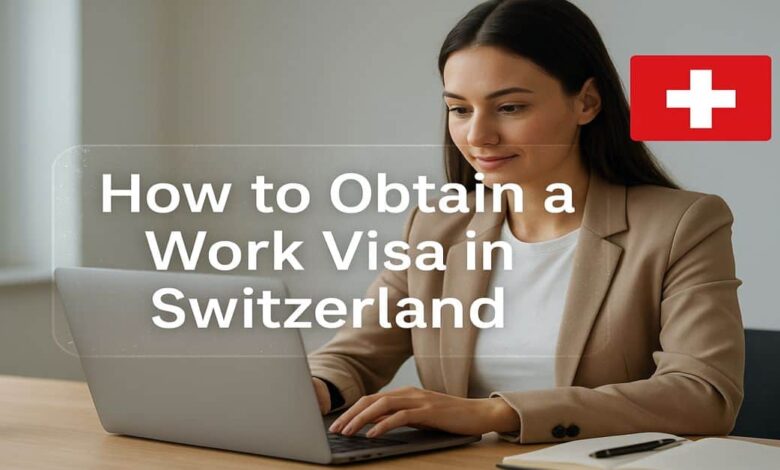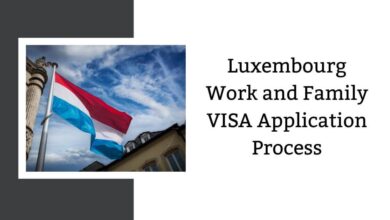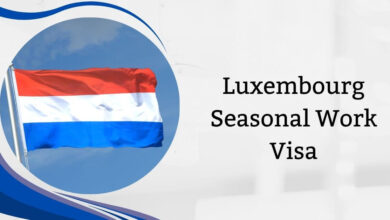How to Obtain a Work Visa in Switzerland 2026

Switzerland is more than just snow-capped mountains and chocolate; it’s a land of incredible career opportunities for professionals from around the world. Imagine working in a country where your skills are valued, your work-life balance is respected, and your career growth is nurtured, all while enjoying breathtaking landscapes and a high standard of living.
But before packing your bags, there’s an important step: securing a Swiss work visa. Whether you’re an ambitious engineer, a talented IT professional, or a dedicated healthcare worker, understanding how to navigate the visa process is the first step toward turning this dream into reality.
Check Also: Switzerland Work Visa Process
Switzerland Work Visa:
Professionals from all over the world can find exciting jobs in Switzerland. However, getting a work visa is a basic condition for getting a job. This guide is meant to give you a clear picture of how to apply for a work visa, what you need to do to be eligible, and what tools are available to help you join the Swiss workforce.
Understanding the Basics:
As a non-EU member but a part of the Schengen Agreement, Switzerland has different rules for people from different countries when it comes to visas. You don’t need a work visa to move to and work in Switzerland if you are from an EU or EFTA country. But for people who are not from the EU or EFTA, the process is a little more difficult.
Criteria for Eligibility:
Switzerland is eager to welcome workers with the right skills. To be considered, you must check these boxes:
- Professional Qualification: Having a college degree or a lot of work experience and knowledge in your field.
- Job Confirmation: I already have a confirmed job offer from a Swiss employer.
- Visa Quotas: Make sure that your application fits within the Swiss government’s annual visa limits.
Types of Work Visas:
- Permit L (Short-term Residence):
- Issued initially for a year.
- Must have a job confirmation from a Swiss company.
- Non-renewable beyond 24 months.
- Permit B (Long-term Residence):
- Renewable every year.
- You can get a C Permit after living with a B Permit for 10 years in a row.
- Permit C (Permanent Residence):
- Can live anywhere in Switzerland and work for any company.
Benefits of Work Visa in Switzerland
Access to a High-Quality Work Environment
- Switzerland provides a top-notch working environment with strict guidelines for overall conditions, workplace safety, and labor rights.
Competitive Salaries and Benefits
- high salaries in a variety of fields, particularly in IT, engineering, and finance.
- Workers receive pension benefits, paid time off, and health insurance.
Work-Life Balance
- With extensive paid time off, flexible work schedules, and assistance with family care, Swiss companies place a strong emphasis on a healthy work-life balance.
Pathway to Permanent Residency
- Foreign people can apply for permanent residency (C Permit) after living in Switzerland continuously for five to ten years on a work visa.
Access to Switzerland’s Social System
- In Switzerland, legal professionals are entitled to social security, healthcare, and education.
Swiss Economy Stability
- With solid economic development and job stability, Switzerland boasts one of the most stable economies in Europe.
Cultural and Professional Growth
- The multicultural workplace in Switzerland offers networking possibilities and exposure to global business practices.
- A multilingual setting that includes French, German, and Italian fosters both professional and personal development.
High Standard of Living
- high standard of living with access to first-rate public transportation, infrastructure, and scenic views.
Protection under Swiss Labor Laws
- Swiss law offers workers robust labor safeguards, such as rules governing paid holidays, working hours, and workplace safety.
Tax Efficiency
- Especially for highly qualified professionals, Switzerland offers very cheap taxes when compared to other European nations.
Where to Look for Visa Sponsorship Jobs?
Many global companies that are known for sponsoring work visas are based in Switzerland. Here are some well-known names:
- Nestle
- Novartis
- Roche Group
- Glencore
- Adecco
- United Nations
- World Health Organization
- World Trade Organization
- CERN
- ETH Zurich
In addition to businesses, universities, and study centers such as the University of Geneva, the University of Basel, and the University of Bern often have jobs that can help people get visas.
You could do a full job search on the EURES Portal, which lets you narrow your search to jobs in Switzerland.
How to Obtain a Work Visa in Switzerland?
- Step 1: You should look for work in Switzerland and make sure that the company will pay for your visa
- Step 2: Get together all the paperwork you need to apply for a work visa.
- Step 3: Your boss will apply for a residence pass for you in Switzerland.
- Step 4: Get a work visa for Switzerland in your home country.
People who don’t live in the EU can apply at Swiss offices, consulates, or through VFS Global in their own countries.
Conclusion:
Switzerland offers skilled professionals a unique chance to grow in a stable, high-paying, and culturally rich environment. Securing a work visa opens doors to excellent benefits, work-life balance, and long-term residency opportunities. With careful preparation, your dream career in Switzerland can become a reality.
Frequently Asked Questions:
Can I apply for a work visa in Switzerland without a job offer?
Without a job offer, it is possible to apply for a work visa in Switzerland. However, based on your specific situation, the procedure and prerequisites can change. Applying for a work-seeker visa is one way to start your job search in Switzerland. It is imperative that you become acquainted with the particular requirements and restrictions linked to this category of visa.
How long does it take to process a work visa application?
An application for a work visa in Switzerland may take a variety of times to process. The processing of the application by the authorities typically takes between eight and twelve weeks. This timeline, however, could change based on a number of variables, including the intricacy of the application, the volume of work at the immigration office, and the particular canton in which you are applying.




